Determination and Prevention of Diabetes Mellitus & Health Factors
VerifiedAdded on 2023/04/24
|14
|4640
|381
Report
AI Summary
This report provides an overview of diabetes mellitus, with a focus on type 2 diabetes and its prevalence in Australia, especially among Aboriginal and Torres Strait Islander people. It discusses the various determinants of health, including social status, education, genetics, physical environment, and gender, and how these factors contribute to the development of diabetes. The report examines genetic factors, metabolically healthy obesity, and stress-related factors as key contributors to the disease. It also explains epidemiological and statistical terms relevant to understanding diabetes research. Furthermore, it outlines strategies developed by the Australian government to reduce and prevent diabetes among indigenous populations, including access to healthcare, self-management programs, prevention programs, and community awareness initiatives. The report emphasizes the importance of addressing health disparities and promoting culturally relevant healthcare to improve the health outcomes of Aboriginal and Torres Strait Islander people.
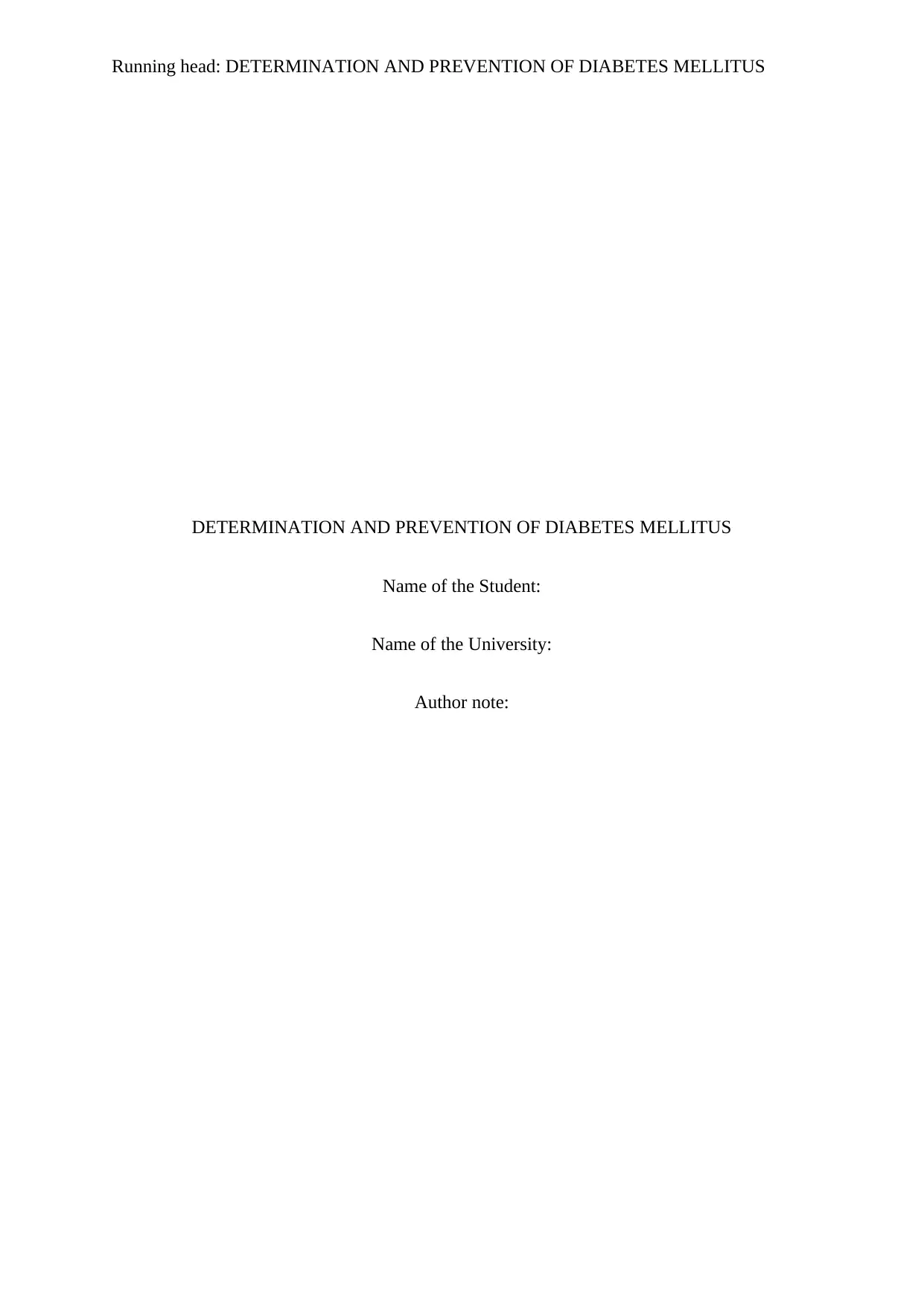
Running head: DETERMINATION AND PREVENTION OF DIABETES MELLITUS
DETERMINATION AND PREVENTION OF DIABETES MELLITUS
Name of the Student:
Name of the University:
Author note:
DETERMINATION AND PREVENTION OF DIABETES MELLITUS
Name of the Student:
Name of the University:
Author note:
Paraphrase This Document
Need a fresh take? Get an instant paraphrase of this document with our AI Paraphraser
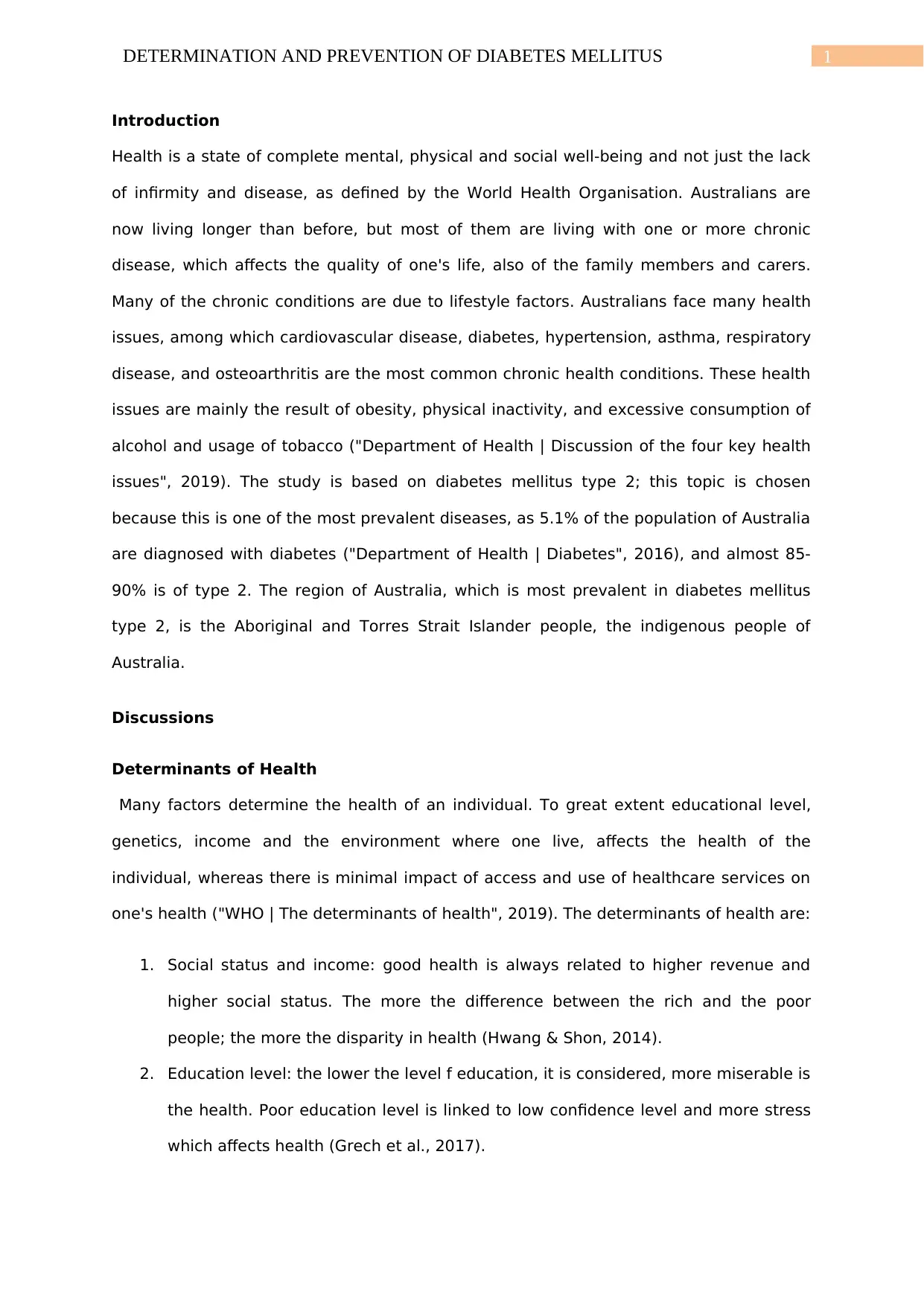
1DETERMINATION AND PREVENTION OF DIABETES MELLITUS
Introduction
Health is a state of complete mental, physical and social well-being and not just the lack
of infirmity and disease, as defined by the World Health Organisation. Australians are
now living longer than before, but most of them are living with one or more chronic
disease, which affects the quality of one's life, also of the family members and carers.
Many of the chronic conditions are due to lifestyle factors. Australians face many health
issues, among which cardiovascular disease, diabetes, hypertension, asthma, respiratory
disease, and osteoarthritis are the most common chronic health conditions. These health
issues are mainly the result of obesity, physical inactivity, and excessive consumption of
alcohol and usage of tobacco ("Department of Health | Discussion of the four key health
issues", 2019). The study is based on diabetes mellitus type 2; this topic is chosen
because this is one of the most prevalent diseases, as 5.1% of the population of Australia
are diagnosed with diabetes ("Department of Health | Diabetes", 2016), and almost 85-
90% is of type 2. The region of Australia, which is most prevalent in diabetes mellitus
type 2, is the Aboriginal and Torres Strait Islander people, the indigenous people of
Australia.
Discussions
Determinants of Health
Many factors determine the health of an individual. To great extent educational level,
genetics, income and the environment where one live, affects the health of the
individual, whereas there is minimal impact of access and use of healthcare services on
one's health ("WHO | The determinants of health", 2019). The determinants of health are:
1. Social status and income: good health is always related to higher revenue and
higher social status. The more the difference between the rich and the poor
people; the more the disparity in health (Hwang & Shon, 2014).
2. Education level: the lower the level f education, it is considered, more miserable is
the health. Poor education level is linked to low confidence level and more stress
which affects health (Grech et al., 2017).
Introduction
Health is a state of complete mental, physical and social well-being and not just the lack
of infirmity and disease, as defined by the World Health Organisation. Australians are
now living longer than before, but most of them are living with one or more chronic
disease, which affects the quality of one's life, also of the family members and carers.
Many of the chronic conditions are due to lifestyle factors. Australians face many health
issues, among which cardiovascular disease, diabetes, hypertension, asthma, respiratory
disease, and osteoarthritis are the most common chronic health conditions. These health
issues are mainly the result of obesity, physical inactivity, and excessive consumption of
alcohol and usage of tobacco ("Department of Health | Discussion of the four key health
issues", 2019). The study is based on diabetes mellitus type 2; this topic is chosen
because this is one of the most prevalent diseases, as 5.1% of the population of Australia
are diagnosed with diabetes ("Department of Health | Diabetes", 2016), and almost 85-
90% is of type 2. The region of Australia, which is most prevalent in diabetes mellitus
type 2, is the Aboriginal and Torres Strait Islander people, the indigenous people of
Australia.
Discussions
Determinants of Health
Many factors determine the health of an individual. To great extent educational level,
genetics, income and the environment where one live, affects the health of the
individual, whereas there is minimal impact of access and use of healthcare services on
one's health ("WHO | The determinants of health", 2019). The determinants of health are:
1. Social status and income: good health is always related to higher revenue and
higher social status. The more the difference between the rich and the poor
people; the more the disparity in health (Hwang & Shon, 2014).
2. Education level: the lower the level f education, it is considered, more miserable is
the health. Poor education level is linked to low confidence level and more stress
which affects health (Grech et al., 2017).
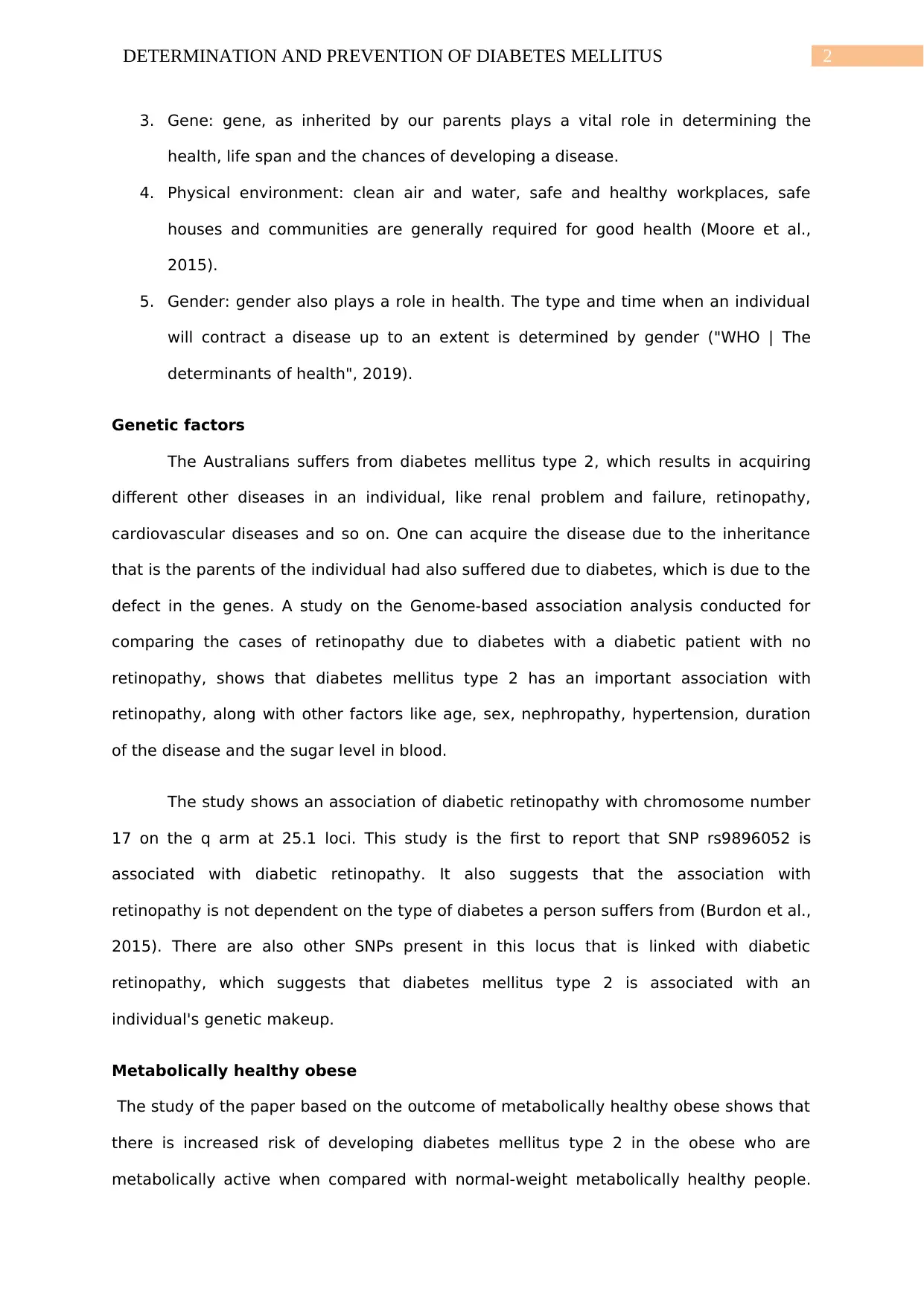
2DETERMINATION AND PREVENTION OF DIABETES MELLITUS
3. Gene: gene, as inherited by our parents plays a vital role in determining the
health, life span and the chances of developing a disease.
4. Physical environment: clean air and water, safe and healthy workplaces, safe
houses and communities are generally required for good health (Moore et al.,
2015).
5. Gender: gender also plays a role in health. The type and time when an individual
will contract a disease up to an extent is determined by gender ("WHO | The
determinants of health", 2019).
Genetic factors
The Australians suffers from diabetes mellitus type 2, which results in acquiring
different other diseases in an individual, like renal problem and failure, retinopathy,
cardiovascular diseases and so on. One can acquire the disease due to the inheritance
that is the parents of the individual had also suffered due to diabetes, which is due to the
defect in the genes. A study on the Genome-based association analysis conducted for
comparing the cases of retinopathy due to diabetes with a diabetic patient with no
retinopathy, shows that diabetes mellitus type 2 has an important association with
retinopathy, along with other factors like age, sex, nephropathy, hypertension, duration
of the disease and the sugar level in blood.
The study shows an association of diabetic retinopathy with chromosome number
17 on the q arm at 25.1 loci. This study is the first to report that SNP rs9896052 is
associated with diabetic retinopathy. It also suggests that the association with
retinopathy is not dependent on the type of diabetes a person suffers from (Burdon et al.,
2015). There are also other SNPs present in this locus that is linked with diabetic
retinopathy, which suggests that diabetes mellitus type 2 is associated with an
individual's genetic makeup.
Metabolically healthy obese
The study of the paper based on the outcome of metabolically healthy obese shows that
there is increased risk of developing diabetes mellitus type 2 in the obese who are
metabolically active when compared with normal-weight metabolically healthy people.
3. Gene: gene, as inherited by our parents plays a vital role in determining the
health, life span and the chances of developing a disease.
4. Physical environment: clean air and water, safe and healthy workplaces, safe
houses and communities are generally required for good health (Moore et al.,
2015).
5. Gender: gender also plays a role in health. The type and time when an individual
will contract a disease up to an extent is determined by gender ("WHO | The
determinants of health", 2019).
Genetic factors
The Australians suffers from diabetes mellitus type 2, which results in acquiring
different other diseases in an individual, like renal problem and failure, retinopathy,
cardiovascular diseases and so on. One can acquire the disease due to the inheritance
that is the parents of the individual had also suffered due to diabetes, which is due to the
defect in the genes. A study on the Genome-based association analysis conducted for
comparing the cases of retinopathy due to diabetes with a diabetic patient with no
retinopathy, shows that diabetes mellitus type 2 has an important association with
retinopathy, along with other factors like age, sex, nephropathy, hypertension, duration
of the disease and the sugar level in blood.
The study shows an association of diabetic retinopathy with chromosome number
17 on the q arm at 25.1 loci. This study is the first to report that SNP rs9896052 is
associated with diabetic retinopathy. It also suggests that the association with
retinopathy is not dependent on the type of diabetes a person suffers from (Burdon et al.,
2015). There are also other SNPs present in this locus that is linked with diabetic
retinopathy, which suggests that diabetes mellitus type 2 is associated with an
individual's genetic makeup.
Metabolically healthy obese
The study of the paper based on the outcome of metabolically healthy obese shows that
there is increased risk of developing diabetes mellitus type 2 in the obese who are
metabolically active when compared with normal-weight metabolically healthy people.
⊘ This is a preview!⊘
Do you want full access?
Subscribe today to unlock all pages.

Trusted by 1+ million students worldwide
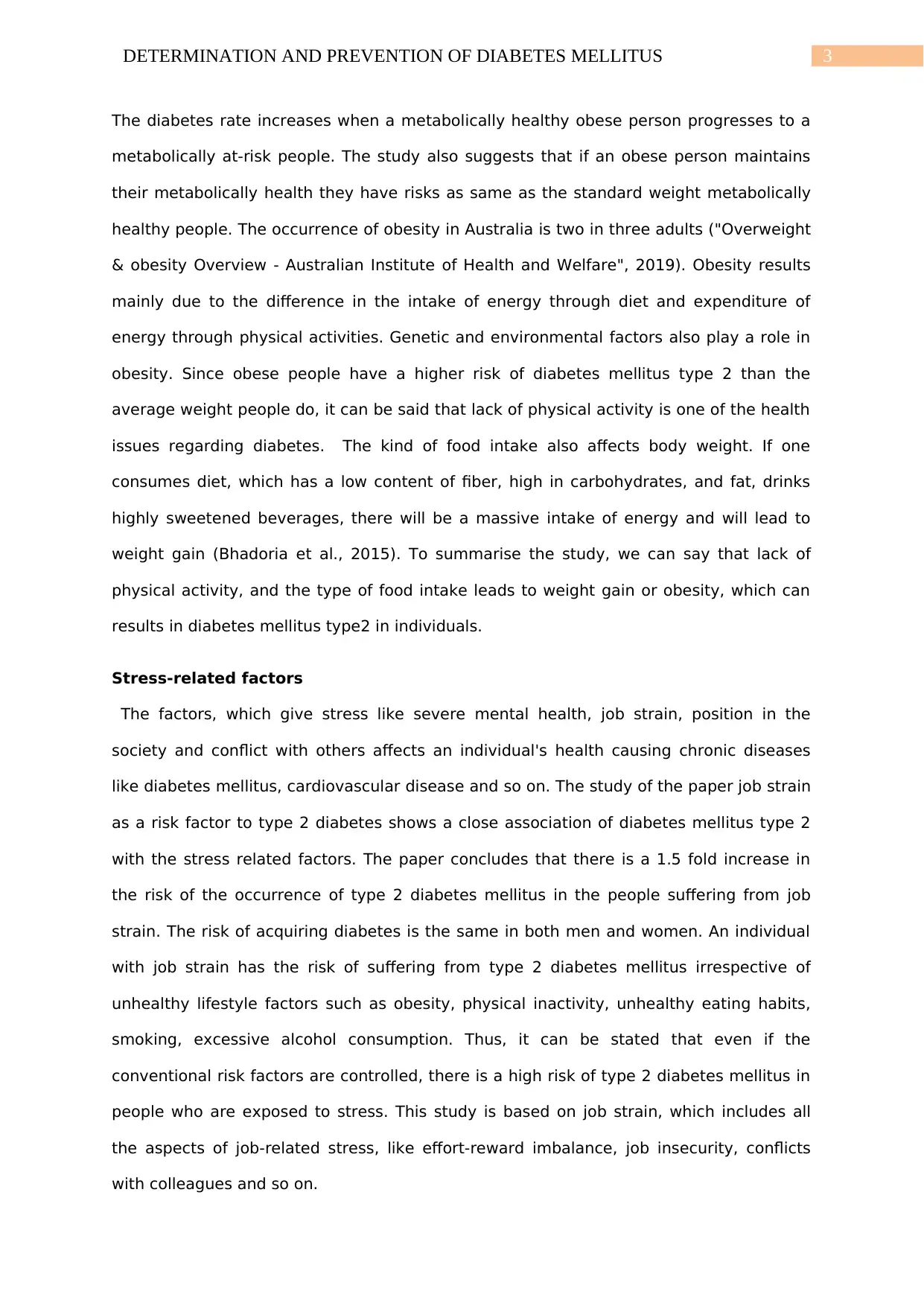
3DETERMINATION AND PREVENTION OF DIABETES MELLITUS
The diabetes rate increases when a metabolically healthy obese person progresses to a
metabolically at-risk people. The study also suggests that if an obese person maintains
their metabolically health they have risks as same as the standard weight metabolically
healthy people. The occurrence of obesity in Australia is two in three adults ("Overweight
& obesity Overview - Australian Institute of Health and Welfare", 2019). Obesity results
mainly due to the difference in the intake of energy through diet and expenditure of
energy through physical activities. Genetic and environmental factors also play a role in
obesity. Since obese people have a higher risk of diabetes mellitus type 2 than the
average weight people do, it can be said that lack of physical activity is one of the health
issues regarding diabetes. The kind of food intake also affects body weight. If one
consumes diet, which has a low content of fiber, high in carbohydrates, and fat, drinks
highly sweetened beverages, there will be a massive intake of energy and will lead to
weight gain (Bhadoria et al., 2015). To summarise the study, we can say that lack of
physical activity, and the type of food intake leads to weight gain or obesity, which can
results in diabetes mellitus type2 in individuals.
Stress-related factors
The factors, which give stress like severe mental health, job strain, position in the
society and conflict with others affects an individual's health causing chronic diseases
like diabetes mellitus, cardiovascular disease and so on. The study of the paper job strain
as a risk factor to type 2 diabetes shows a close association of diabetes mellitus type 2
with the stress related factors. The paper concludes that there is a 1.5 fold increase in
the risk of the occurrence of type 2 diabetes mellitus in the people suffering from job
strain. The risk of acquiring diabetes is the same in both men and women. An individual
with job strain has the risk of suffering from type 2 diabetes mellitus irrespective of
unhealthy lifestyle factors such as obesity, physical inactivity, unhealthy eating habits,
smoking, excessive alcohol consumption. Thus, it can be stated that even if the
conventional risk factors are controlled, there is a high risk of type 2 diabetes mellitus in
people who are exposed to stress. This study is based on job strain, which includes all
the aspects of job-related stress, like effort-reward imbalance, job insecurity, conflicts
with colleagues and so on.
The diabetes rate increases when a metabolically healthy obese person progresses to a
metabolically at-risk people. The study also suggests that if an obese person maintains
their metabolically health they have risks as same as the standard weight metabolically
healthy people. The occurrence of obesity in Australia is two in three adults ("Overweight
& obesity Overview - Australian Institute of Health and Welfare", 2019). Obesity results
mainly due to the difference in the intake of energy through diet and expenditure of
energy through physical activities. Genetic and environmental factors also play a role in
obesity. Since obese people have a higher risk of diabetes mellitus type 2 than the
average weight people do, it can be said that lack of physical activity is one of the health
issues regarding diabetes. The kind of food intake also affects body weight. If one
consumes diet, which has a low content of fiber, high in carbohydrates, and fat, drinks
highly sweetened beverages, there will be a massive intake of energy and will lead to
weight gain (Bhadoria et al., 2015). To summarise the study, we can say that lack of
physical activity, and the type of food intake leads to weight gain or obesity, which can
results in diabetes mellitus type2 in individuals.
Stress-related factors
The factors, which give stress like severe mental health, job strain, position in the
society and conflict with others affects an individual's health causing chronic diseases
like diabetes mellitus, cardiovascular disease and so on. The study of the paper job strain
as a risk factor to type 2 diabetes shows a close association of diabetes mellitus type 2
with the stress related factors. The paper concludes that there is a 1.5 fold increase in
the risk of the occurrence of type 2 diabetes mellitus in the people suffering from job
strain. The risk of acquiring diabetes is the same in both men and women. An individual
with job strain has the risk of suffering from type 2 diabetes mellitus irrespective of
unhealthy lifestyle factors such as obesity, physical inactivity, unhealthy eating habits,
smoking, excessive alcohol consumption. Thus, it can be stated that even if the
conventional risk factors are controlled, there is a high risk of type 2 diabetes mellitus in
people who are exposed to stress. This study is based on job strain, which includes all
the aspects of job-related stress, like effort-reward imbalance, job insecurity, conflicts
with colleagues and so on.
Paraphrase This Document
Need a fresh take? Get an instant paraphrase of this document with our AI Paraphraser
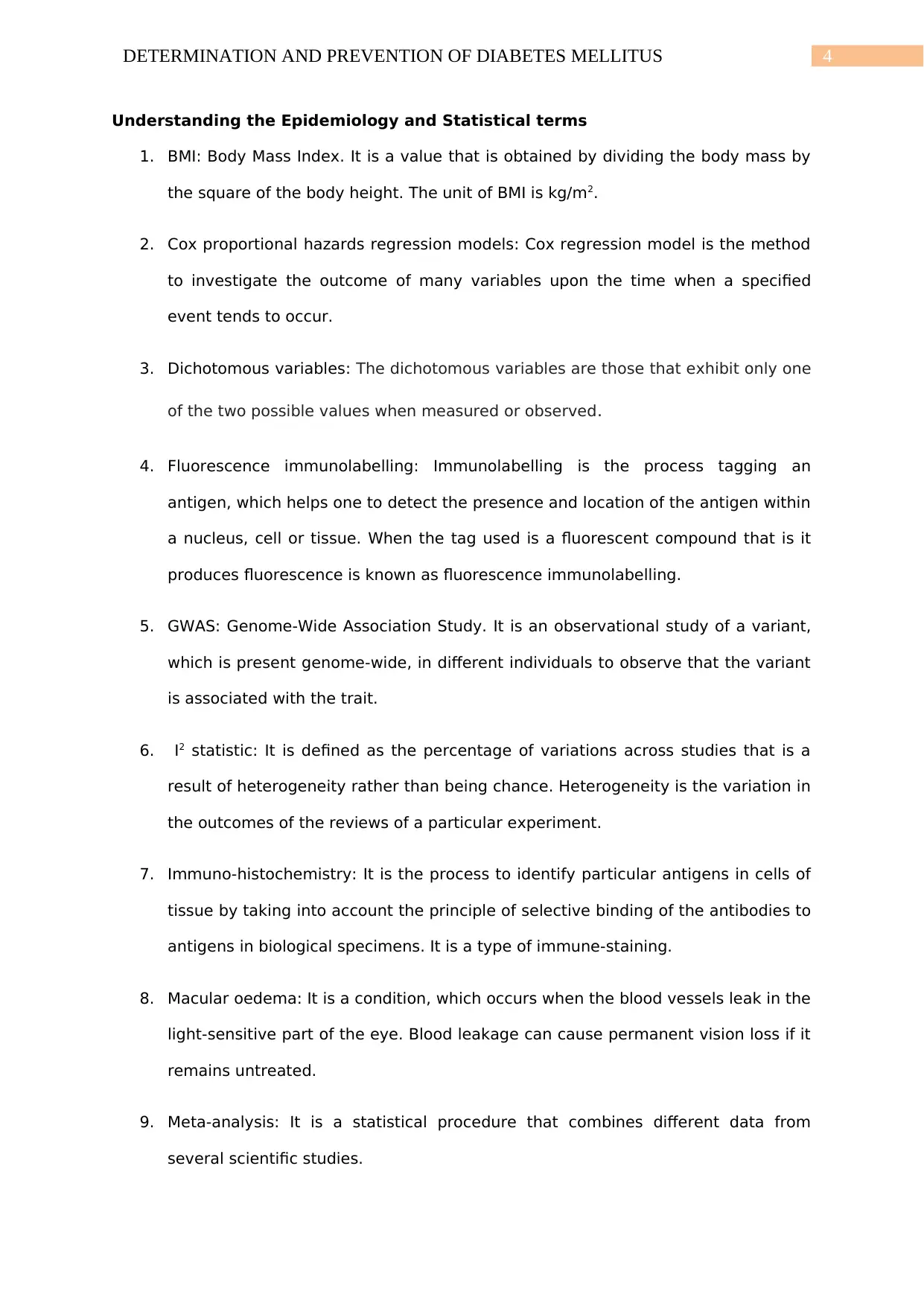
4DETERMINATION AND PREVENTION OF DIABETES MELLITUS
Understanding the Epidemiology and Statistical terms
1. BMI: Body Mass Index. It is a value that is obtained by dividing the body mass by
the square of the body height. The unit of BMI is kg/m2.
2. Cox proportional hazards regression models: Cox regression model is the method
to investigate the outcome of many variables upon the time when a specified
event tends to occur.
3. Dichotomous variables: The dichotomous variables are those that exhibit only one
of the two possible values when measured or observed.
4. Fluorescence immunolabelling: Immunolabelling is the process tagging an
antigen, which helps one to detect the presence and location of the antigen within
a nucleus, cell or tissue. When the tag used is a fluorescent compound that is it
produces fluorescence is known as fluorescence immunolabelling.
5. GWAS: Genome-Wide Association Study. It is an observational study of a variant,
which is present genome-wide, in different individuals to observe that the variant
is associated with the trait.
6. I2 statistic: It is defined as the percentage of variations across studies that is a
result of heterogeneity rather than being chance. Heterogeneity is the variation in
the outcomes of the reviews of a particular experiment.
7. Immuno-histochemistry: It is the process to identify particular antigens in cells of
tissue by taking into account the principle of selective binding of the antibodies to
antigens in biological specimens. It is a type of immune-staining.
8. Macular oedema: It is a condition, which occurs when the blood vessels leak in the
light-sensitive part of the eye. Blood leakage can cause permanent vision loss if it
remains untreated.
9. Meta-analysis: It is a statistical procedure that combines different data from
several scientific studies.
Understanding the Epidemiology and Statistical terms
1. BMI: Body Mass Index. It is a value that is obtained by dividing the body mass by
the square of the body height. The unit of BMI is kg/m2.
2. Cox proportional hazards regression models: Cox regression model is the method
to investigate the outcome of many variables upon the time when a specified
event tends to occur.
3. Dichotomous variables: The dichotomous variables are those that exhibit only one
of the two possible values when measured or observed.
4. Fluorescence immunolabelling: Immunolabelling is the process tagging an
antigen, which helps one to detect the presence and location of the antigen within
a nucleus, cell or tissue. When the tag used is a fluorescent compound that is it
produces fluorescence is known as fluorescence immunolabelling.
5. GWAS: Genome-Wide Association Study. It is an observational study of a variant,
which is present genome-wide, in different individuals to observe that the variant
is associated with the trait.
6. I2 statistic: It is defined as the percentage of variations across studies that is a
result of heterogeneity rather than being chance. Heterogeneity is the variation in
the outcomes of the reviews of a particular experiment.
7. Immuno-histochemistry: It is the process to identify particular antigens in cells of
tissue by taking into account the principle of selective binding of the antibodies to
antigens in biological specimens. It is a type of immune-staining.
8. Macular oedema: It is a condition, which occurs when the blood vessels leak in the
light-sensitive part of the eye. Blood leakage can cause permanent vision loss if it
remains untreated.
9. Meta-analysis: It is a statistical procedure that combines different data from
several scientific studies.
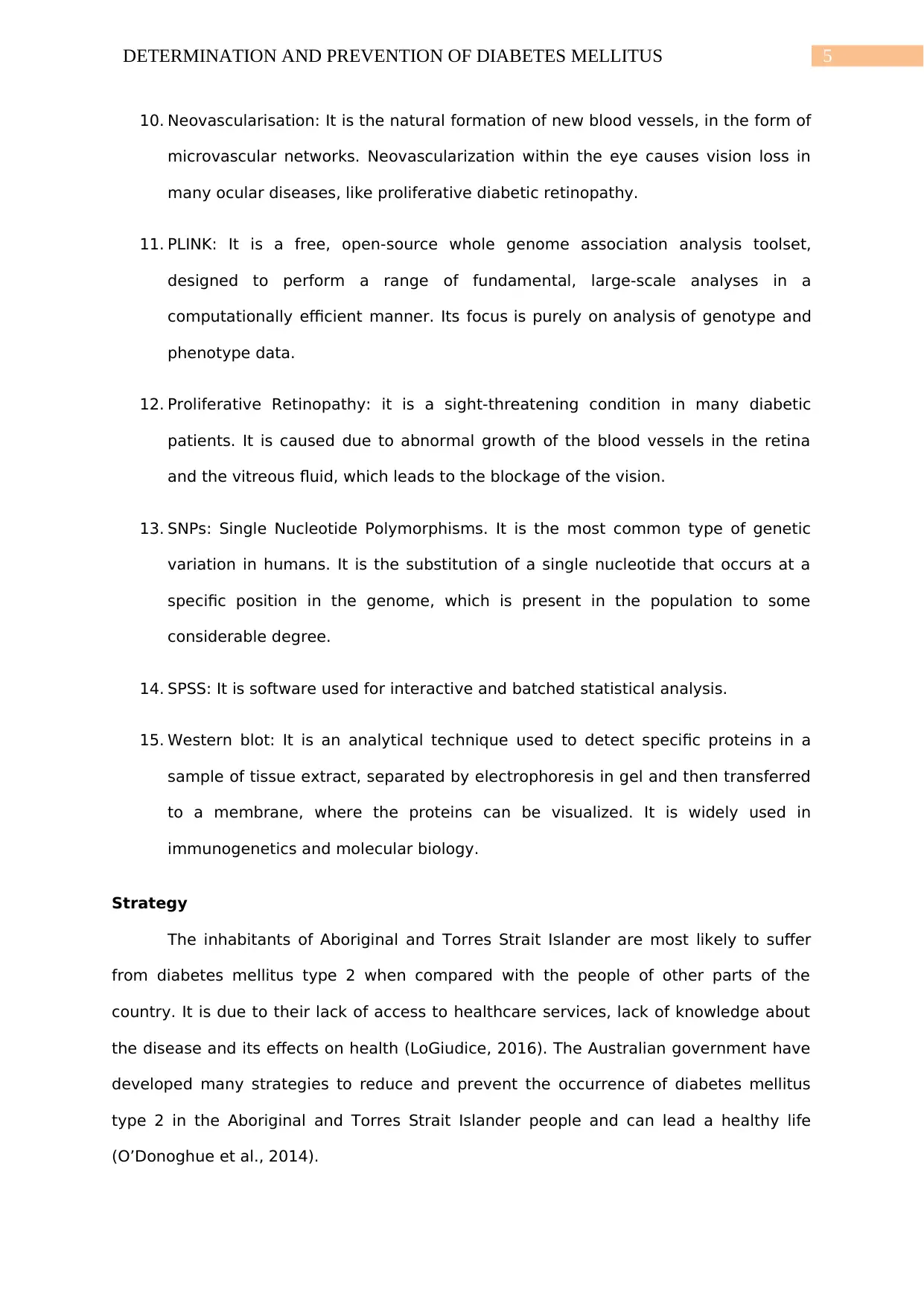
5DETERMINATION AND PREVENTION OF DIABETES MELLITUS
10. Neovascularisation: It is the natural formation of new blood vessels, in the form of
microvascular networks. Neovascularization within the eye causes vision loss in
many ocular diseases, like proliferative diabetic retinopathy.
11. PLINK: It is a free, open-source whole genome association analysis toolset,
designed to perform a range of fundamental, large-scale analyses in a
computationally efficient manner. Its focus is purely on analysis of genotype and
phenotype data.
12. Proliferative Retinopathy: it is a sight-threatening condition in many diabetic
patients. It is caused due to abnormal growth of the blood vessels in the retina
and the vitreous fluid, which leads to the blockage of the vision.
13. SNPs: Single Nucleotide Polymorphisms. It is the most common type of genetic
variation in humans. It is the substitution of a single nucleotide that occurs at a
specific position in the genome, which is present in the population to some
considerable degree.
14. SPSS: It is software used for interactive and batched statistical analysis.
15. Western blot: It is an analytical technique used to detect specific proteins in a
sample of tissue extract, separated by electrophoresis in gel and then transferred
to a membrane, where the proteins can be visualized. It is widely used in
immunogenetics and molecular biology.
Strategy
The inhabitants of Aboriginal and Torres Strait Islander are most likely to suffer
from diabetes mellitus type 2 when compared with the people of other parts of the
country. It is due to their lack of access to healthcare services, lack of knowledge about
the disease and its effects on health (LoGiudice, 2016). The Australian government have
developed many strategies to reduce and prevent the occurrence of diabetes mellitus
type 2 in the Aboriginal and Torres Strait Islander people and can lead a healthy life
(O’Donoghue et al., 2014).
10. Neovascularisation: It is the natural formation of new blood vessels, in the form of
microvascular networks. Neovascularization within the eye causes vision loss in
many ocular diseases, like proliferative diabetic retinopathy.
11. PLINK: It is a free, open-source whole genome association analysis toolset,
designed to perform a range of fundamental, large-scale analyses in a
computationally efficient manner. Its focus is purely on analysis of genotype and
phenotype data.
12. Proliferative Retinopathy: it is a sight-threatening condition in many diabetic
patients. It is caused due to abnormal growth of the blood vessels in the retina
and the vitreous fluid, which leads to the blockage of the vision.
13. SNPs: Single Nucleotide Polymorphisms. It is the most common type of genetic
variation in humans. It is the substitution of a single nucleotide that occurs at a
specific position in the genome, which is present in the population to some
considerable degree.
14. SPSS: It is software used for interactive and batched statistical analysis.
15. Western blot: It is an analytical technique used to detect specific proteins in a
sample of tissue extract, separated by electrophoresis in gel and then transferred
to a membrane, where the proteins can be visualized. It is widely used in
immunogenetics and molecular biology.
Strategy
The inhabitants of Aboriginal and Torres Strait Islander are most likely to suffer
from diabetes mellitus type 2 when compared with the people of other parts of the
country. It is due to their lack of access to healthcare services, lack of knowledge about
the disease and its effects on health (LoGiudice, 2016). The Australian government have
developed many strategies to reduce and prevent the occurrence of diabetes mellitus
type 2 in the Aboriginal and Torres Strait Islander people and can lead a healthy life
(O’Donoghue et al., 2014).
⊘ This is a preview!⊘
Do you want full access?
Subscribe today to unlock all pages.

Trusted by 1+ million students worldwide
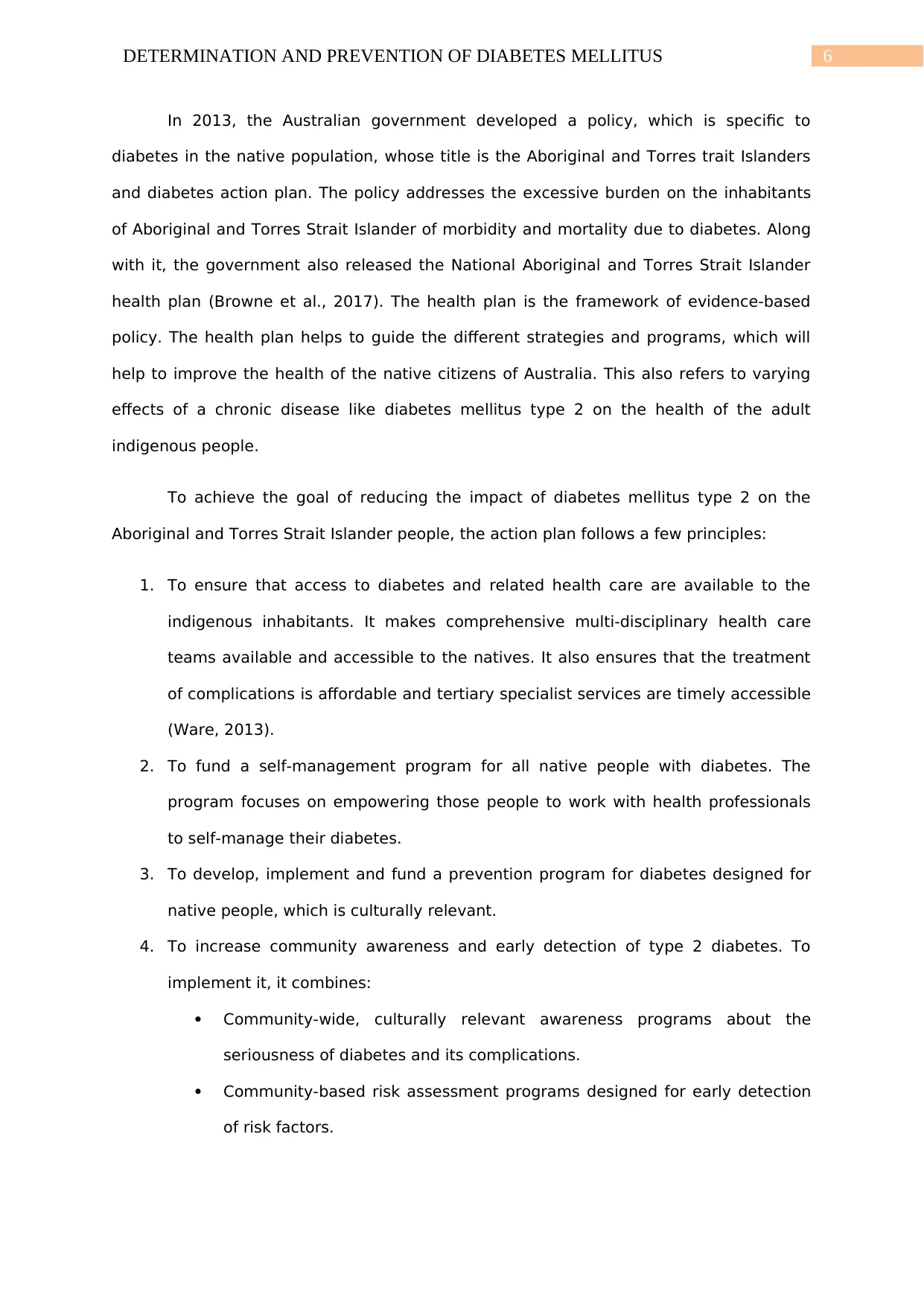
6DETERMINATION AND PREVENTION OF DIABETES MELLITUS
In 2013, the Australian government developed a policy, which is specific to
diabetes in the native population, whose title is the Aboriginal and Torres trait Islanders
and diabetes action plan. The policy addresses the excessive burden on the inhabitants
of Aboriginal and Torres Strait Islander of morbidity and mortality due to diabetes. Along
with it, the government also released the National Aboriginal and Torres Strait Islander
health plan (Browne et al., 2017). The health plan is the framework of evidence-based
policy. The health plan helps to guide the different strategies and programs, which will
help to improve the health of the native citizens of Australia. This also refers to varying
effects of a chronic disease like diabetes mellitus type 2 on the health of the adult
indigenous people.
To achieve the goal of reducing the impact of diabetes mellitus type 2 on the
Aboriginal and Torres Strait Islander people, the action plan follows a few principles:
1. To ensure that access to diabetes and related health care are available to the
indigenous inhabitants. It makes comprehensive multi-disciplinary health care
teams available and accessible to the natives. It also ensures that the treatment
of complications is affordable and tertiary specialist services are timely accessible
(Ware, 2013).
2. To fund a self-management program for all native people with diabetes. The
program focuses on empowering those people to work with health professionals
to self-manage their diabetes.
3. To develop, implement and fund a prevention program for diabetes designed for
native people, which is culturally relevant.
4. To increase community awareness and early detection of type 2 diabetes. To
implement it, it combines:
Community-wide, culturally relevant awareness programs about the
seriousness of diabetes and its complications.
Community-based risk assessment programs designed for early detection
of risk factors.
In 2013, the Australian government developed a policy, which is specific to
diabetes in the native population, whose title is the Aboriginal and Torres trait Islanders
and diabetes action plan. The policy addresses the excessive burden on the inhabitants
of Aboriginal and Torres Strait Islander of morbidity and mortality due to diabetes. Along
with it, the government also released the National Aboriginal and Torres Strait Islander
health plan (Browne et al., 2017). The health plan is the framework of evidence-based
policy. The health plan helps to guide the different strategies and programs, which will
help to improve the health of the native citizens of Australia. This also refers to varying
effects of a chronic disease like diabetes mellitus type 2 on the health of the adult
indigenous people.
To achieve the goal of reducing the impact of diabetes mellitus type 2 on the
Aboriginal and Torres Strait Islander people, the action plan follows a few principles:
1. To ensure that access to diabetes and related health care are available to the
indigenous inhabitants. It makes comprehensive multi-disciplinary health care
teams available and accessible to the natives. It also ensures that the treatment
of complications is affordable and tertiary specialist services are timely accessible
(Ware, 2013).
2. To fund a self-management program for all native people with diabetes. The
program focuses on empowering those people to work with health professionals
to self-manage their diabetes.
3. To develop, implement and fund a prevention program for diabetes designed for
native people, which is culturally relevant.
4. To increase community awareness and early detection of type 2 diabetes. To
implement it, it combines:
Community-wide, culturally relevant awareness programs about the
seriousness of diabetes and its complications.
Community-based risk assessment programs designed for early detection
of risk factors.
Paraphrase This Document
Need a fresh take? Get an instant paraphrase of this document with our AI Paraphraser
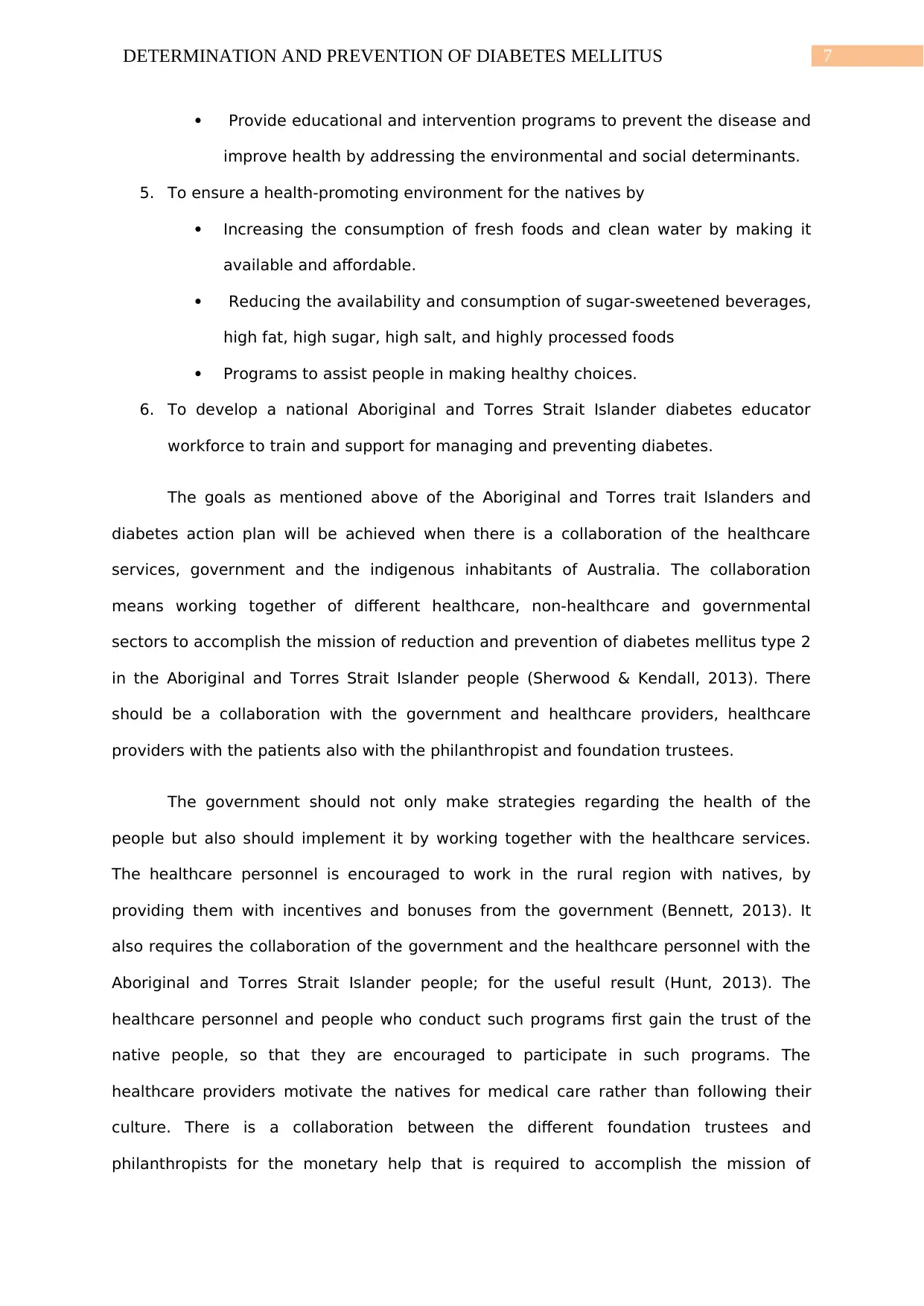
7DETERMINATION AND PREVENTION OF DIABETES MELLITUS
Provide educational and intervention programs to prevent the disease and
improve health by addressing the environmental and social determinants.
5. To ensure a health-promoting environment for the natives by
Increasing the consumption of fresh foods and clean water by making it
available and affordable.
Reducing the availability and consumption of sugar-sweetened beverages,
high fat, high sugar, high salt, and highly processed foods
Programs to assist people in making healthy choices.
6. To develop a national Aboriginal and Torres Strait Islander diabetes educator
workforce to train and support for managing and preventing diabetes.
The goals as mentioned above of the Aboriginal and Torres trait Islanders and
diabetes action plan will be achieved when there is a collaboration of the healthcare
services, government and the indigenous inhabitants of Australia. The collaboration
means working together of different healthcare, non-healthcare and governmental
sectors to accomplish the mission of reduction and prevention of diabetes mellitus type 2
in the Aboriginal and Torres Strait Islander people (Sherwood & Kendall, 2013). There
should be a collaboration with the government and healthcare providers, healthcare
providers with the patients also with the philanthropist and foundation trustees.
The government should not only make strategies regarding the health of the
people but also should implement it by working together with the healthcare services.
The healthcare personnel is encouraged to work in the rural region with natives, by
providing them with incentives and bonuses from the government (Bennett, 2013). It
also requires the collaboration of the government and the healthcare personnel with the
Aboriginal and Torres Strait Islander people; for the useful result (Hunt, 2013). The
healthcare personnel and people who conduct such programs first gain the trust of the
native people, so that they are encouraged to participate in such programs. The
healthcare providers motivate the natives for medical care rather than following their
culture. There is a collaboration between the different foundation trustees and
philanthropists for the monetary help that is required to accomplish the mission of
Provide educational and intervention programs to prevent the disease and
improve health by addressing the environmental and social determinants.
5. To ensure a health-promoting environment for the natives by
Increasing the consumption of fresh foods and clean water by making it
available and affordable.
Reducing the availability and consumption of sugar-sweetened beverages,
high fat, high sugar, high salt, and highly processed foods
Programs to assist people in making healthy choices.
6. To develop a national Aboriginal and Torres Strait Islander diabetes educator
workforce to train and support for managing and preventing diabetes.
The goals as mentioned above of the Aboriginal and Torres trait Islanders and
diabetes action plan will be achieved when there is a collaboration of the healthcare
services, government and the indigenous inhabitants of Australia. The collaboration
means working together of different healthcare, non-healthcare and governmental
sectors to accomplish the mission of reduction and prevention of diabetes mellitus type 2
in the Aboriginal and Torres Strait Islander people (Sherwood & Kendall, 2013). There
should be a collaboration with the government and healthcare providers, healthcare
providers with the patients also with the philanthropist and foundation trustees.
The government should not only make strategies regarding the health of the
people but also should implement it by working together with the healthcare services.
The healthcare personnel is encouraged to work in the rural region with natives, by
providing them with incentives and bonuses from the government (Bennett, 2013). It
also requires the collaboration of the government and the healthcare personnel with the
Aboriginal and Torres Strait Islander people; for the useful result (Hunt, 2013). The
healthcare personnel and people who conduct such programs first gain the trust of the
native people, so that they are encouraged to participate in such programs. The
healthcare providers motivate the natives for medical care rather than following their
culture. There is a collaboration between the different foundation trustees and
philanthropists for the monetary help that is required to accomplish the mission of
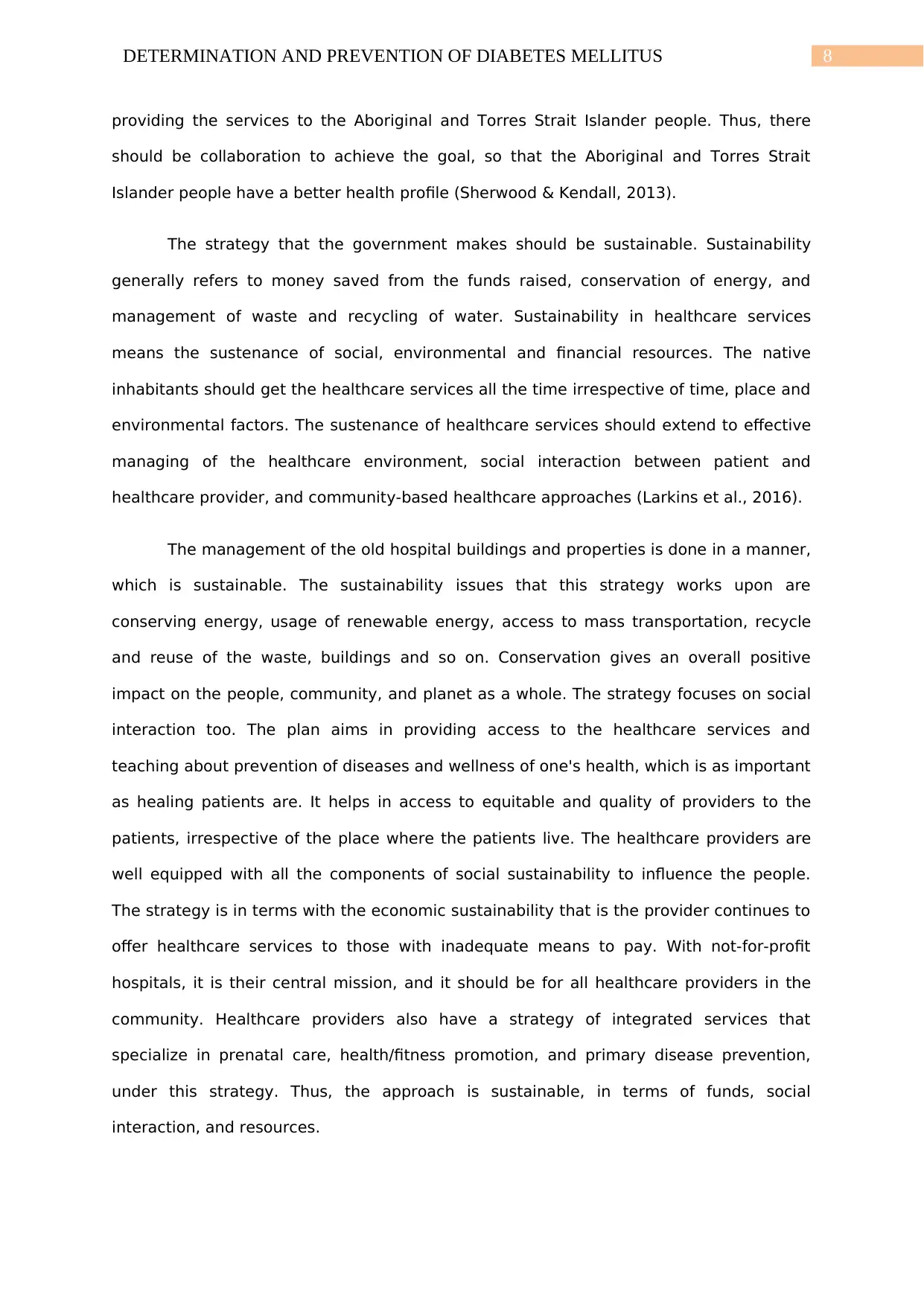
8DETERMINATION AND PREVENTION OF DIABETES MELLITUS
providing the services to the Aboriginal and Torres Strait Islander people. Thus, there
should be collaboration to achieve the goal, so that the Aboriginal and Torres Strait
Islander people have a better health profile (Sherwood & Kendall, 2013).
The strategy that the government makes should be sustainable. Sustainability
generally refers to money saved from the funds raised, conservation of energy, and
management of waste and recycling of water. Sustainability in healthcare services
means the sustenance of social, environmental and financial resources. The native
inhabitants should get the healthcare services all the time irrespective of time, place and
environmental factors. The sustenance of healthcare services should extend to effective
managing of the healthcare environment, social interaction between patient and
healthcare provider, and community-based healthcare approaches (Larkins et al., 2016).
The management of the old hospital buildings and properties is done in a manner,
which is sustainable. The sustainability issues that this strategy works upon are
conserving energy, usage of renewable energy, access to mass transportation, recycle
and reuse of the waste, buildings and so on. Conservation gives an overall positive
impact on the people, community, and planet as a whole. The strategy focuses on social
interaction too. The plan aims in providing access to the healthcare services and
teaching about prevention of diseases and wellness of one's health, which is as important
as healing patients are. It helps in access to equitable and quality of providers to the
patients, irrespective of the place where the patients live. The healthcare providers are
well equipped with all the components of social sustainability to influence the people.
The strategy is in terms with the economic sustainability that is the provider continues to
offer healthcare services to those with inadequate means to pay. With not-for-profit
hospitals, it is their central mission, and it should be for all healthcare providers in the
community. Healthcare providers also have a strategy of integrated services that
specialize in prenatal care, health/fitness promotion, and primary disease prevention,
under this strategy. Thus, the approach is sustainable, in terms of funds, social
interaction, and resources.
providing the services to the Aboriginal and Torres Strait Islander people. Thus, there
should be collaboration to achieve the goal, so that the Aboriginal and Torres Strait
Islander people have a better health profile (Sherwood & Kendall, 2013).
The strategy that the government makes should be sustainable. Sustainability
generally refers to money saved from the funds raised, conservation of energy, and
management of waste and recycling of water. Sustainability in healthcare services
means the sustenance of social, environmental and financial resources. The native
inhabitants should get the healthcare services all the time irrespective of time, place and
environmental factors. The sustenance of healthcare services should extend to effective
managing of the healthcare environment, social interaction between patient and
healthcare provider, and community-based healthcare approaches (Larkins et al., 2016).
The management of the old hospital buildings and properties is done in a manner,
which is sustainable. The sustainability issues that this strategy works upon are
conserving energy, usage of renewable energy, access to mass transportation, recycle
and reuse of the waste, buildings and so on. Conservation gives an overall positive
impact on the people, community, and planet as a whole. The strategy focuses on social
interaction too. The plan aims in providing access to the healthcare services and
teaching about prevention of diseases and wellness of one's health, which is as important
as healing patients are. It helps in access to equitable and quality of providers to the
patients, irrespective of the place where the patients live. The healthcare providers are
well equipped with all the components of social sustainability to influence the people.
The strategy is in terms with the economic sustainability that is the provider continues to
offer healthcare services to those with inadequate means to pay. With not-for-profit
hospitals, it is their central mission, and it should be for all healthcare providers in the
community. Healthcare providers also have a strategy of integrated services that
specialize in prenatal care, health/fitness promotion, and primary disease prevention,
under this strategy. Thus, the approach is sustainable, in terms of funds, social
interaction, and resources.
⊘ This is a preview!⊘
Do you want full access?
Subscribe today to unlock all pages.

Trusted by 1+ million students worldwide
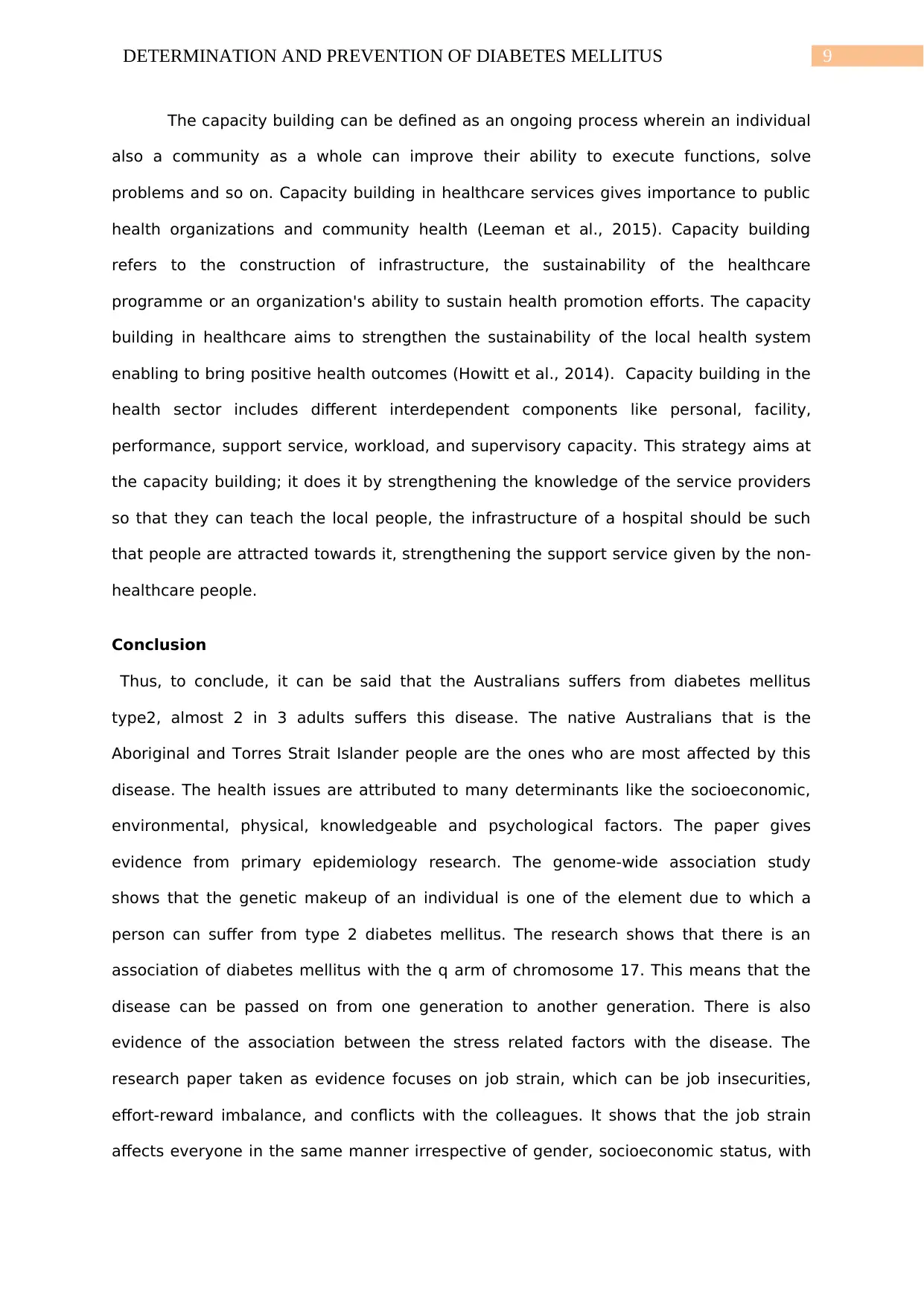
9DETERMINATION AND PREVENTION OF DIABETES MELLITUS
The capacity building can be defined as an ongoing process wherein an individual
also a community as a whole can improve their ability to execute functions, solve
problems and so on. Capacity building in healthcare services gives importance to public
health organizations and community health (Leeman et al., 2015). Capacity building
refers to the construction of infrastructure, the sustainability of the healthcare
programme or an organization's ability to sustain health promotion efforts. The capacity
building in healthcare aims to strengthen the sustainability of the local health system
enabling to bring positive health outcomes (Howitt et al., 2014). Capacity building in the
health sector includes different interdependent components like personal, facility,
performance, support service, workload, and supervisory capacity. This strategy aims at
the capacity building; it does it by strengthening the knowledge of the service providers
so that they can teach the local people, the infrastructure of a hospital should be such
that people are attracted towards it, strengthening the support service given by the non-
healthcare people.
Conclusion
Thus, to conclude, it can be said that the Australians suffers from diabetes mellitus
type2, almost 2 in 3 adults suffers this disease. The native Australians that is the
Aboriginal and Torres Strait Islander people are the ones who are most affected by this
disease. The health issues are attributed to many determinants like the socioeconomic,
environmental, physical, knowledgeable and psychological factors. The paper gives
evidence from primary epidemiology research. The genome-wide association study
shows that the genetic makeup of an individual is one of the element due to which a
person can suffer from type 2 diabetes mellitus. The research shows that there is an
association of diabetes mellitus with the q arm of chromosome 17. This means that the
disease can be passed on from one generation to another generation. There is also
evidence of the association between the stress related factors with the disease. The
research paper taken as evidence focuses on job strain, which can be job insecurities,
effort-reward imbalance, and conflicts with the colleagues. It shows that the job strain
affects everyone in the same manner irrespective of gender, socioeconomic status, with
The capacity building can be defined as an ongoing process wherein an individual
also a community as a whole can improve their ability to execute functions, solve
problems and so on. Capacity building in healthcare services gives importance to public
health organizations and community health (Leeman et al., 2015). Capacity building
refers to the construction of infrastructure, the sustainability of the healthcare
programme or an organization's ability to sustain health promotion efforts. The capacity
building in healthcare aims to strengthen the sustainability of the local health system
enabling to bring positive health outcomes (Howitt et al., 2014). Capacity building in the
health sector includes different interdependent components like personal, facility,
performance, support service, workload, and supervisory capacity. This strategy aims at
the capacity building; it does it by strengthening the knowledge of the service providers
so that they can teach the local people, the infrastructure of a hospital should be such
that people are attracted towards it, strengthening the support service given by the non-
healthcare people.
Conclusion
Thus, to conclude, it can be said that the Australians suffers from diabetes mellitus
type2, almost 2 in 3 adults suffers this disease. The native Australians that is the
Aboriginal and Torres Strait Islander people are the ones who are most affected by this
disease. The health issues are attributed to many determinants like the socioeconomic,
environmental, physical, knowledgeable and psychological factors. The paper gives
evidence from primary epidemiology research. The genome-wide association study
shows that the genetic makeup of an individual is one of the element due to which a
person can suffer from type 2 diabetes mellitus. The research shows that there is an
association of diabetes mellitus with the q arm of chromosome 17. This means that the
disease can be passed on from one generation to another generation. There is also
evidence of the association between the stress related factors with the disease. The
research paper taken as evidence focuses on job strain, which can be job insecurities,
effort-reward imbalance, and conflicts with the colleagues. It shows that the job strain
affects everyone in the same manner irrespective of gender, socioeconomic status, with
Paraphrase This Document
Need a fresh take? Get an instant paraphrase of this document with our AI Paraphraser
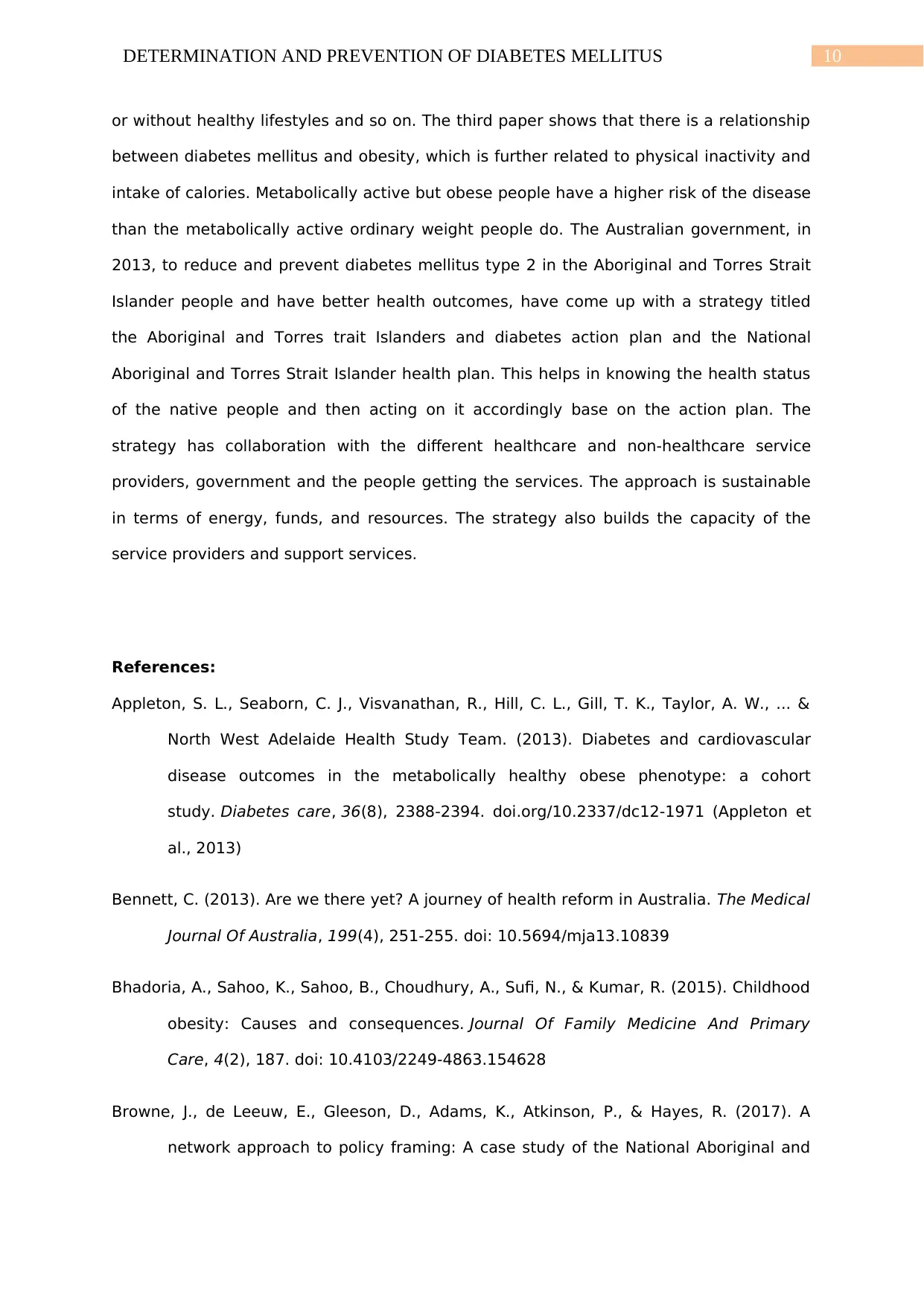
10DETERMINATION AND PREVENTION OF DIABETES MELLITUS
or without healthy lifestyles and so on. The third paper shows that there is a relationship
between diabetes mellitus and obesity, which is further related to physical inactivity and
intake of calories. Metabolically active but obese people have a higher risk of the disease
than the metabolically active ordinary weight people do. The Australian government, in
2013, to reduce and prevent diabetes mellitus type 2 in the Aboriginal and Torres Strait
Islander people and have better health outcomes, have come up with a strategy titled
the Aboriginal and Torres trait Islanders and diabetes action plan and the National
Aboriginal and Torres Strait Islander health plan. This helps in knowing the health status
of the native people and then acting on it accordingly base on the action plan. The
strategy has collaboration with the different healthcare and non-healthcare service
providers, government and the people getting the services. The approach is sustainable
in terms of energy, funds, and resources. The strategy also builds the capacity of the
service providers and support services.
References:
Appleton, S. L., Seaborn, C. J., Visvanathan, R., Hill, C. L., Gill, T. K., Taylor, A. W., ... &
North West Adelaide Health Study Team. (2013). Diabetes and cardiovascular
disease outcomes in the metabolically healthy obese phenotype: a cohort
study. Diabetes care, 36(8), 2388-2394. doi.org/10.2337/dc12-1971 (Appleton et
al., 2013)
Bennett, C. (2013). Are we there yet? A journey of health reform in Australia. The Medical
Journal Of Australia, 199(4), 251-255. doi: 10.5694/mja13.10839
Bhadoria, A., Sahoo, K., Sahoo, B., Choudhury, A., Sufi, N., & Kumar, R. (2015). Childhood
obesity: Causes and consequences. Journal Of Family Medicine And Primary
Care, 4(2), 187. doi: 10.4103/2249-4863.154628
Browne, J., de Leeuw, E., Gleeson, D., Adams, K., Atkinson, P., & Hayes, R. (2017). A
network approach to policy framing: A case study of the National Aboriginal and
or without healthy lifestyles and so on. The third paper shows that there is a relationship
between diabetes mellitus and obesity, which is further related to physical inactivity and
intake of calories. Metabolically active but obese people have a higher risk of the disease
than the metabolically active ordinary weight people do. The Australian government, in
2013, to reduce and prevent diabetes mellitus type 2 in the Aboriginal and Torres Strait
Islander people and have better health outcomes, have come up with a strategy titled
the Aboriginal and Torres trait Islanders and diabetes action plan and the National
Aboriginal and Torres Strait Islander health plan. This helps in knowing the health status
of the native people and then acting on it accordingly base on the action plan. The
strategy has collaboration with the different healthcare and non-healthcare service
providers, government and the people getting the services. The approach is sustainable
in terms of energy, funds, and resources. The strategy also builds the capacity of the
service providers and support services.
References:
Appleton, S. L., Seaborn, C. J., Visvanathan, R., Hill, C. L., Gill, T. K., Taylor, A. W., ... &
North West Adelaide Health Study Team. (2013). Diabetes and cardiovascular
disease outcomes in the metabolically healthy obese phenotype: a cohort
study. Diabetes care, 36(8), 2388-2394. doi.org/10.2337/dc12-1971 (Appleton et
al., 2013)
Bennett, C. (2013). Are we there yet? A journey of health reform in Australia. The Medical
Journal Of Australia, 199(4), 251-255. doi: 10.5694/mja13.10839
Bhadoria, A., Sahoo, K., Sahoo, B., Choudhury, A., Sufi, N., & Kumar, R. (2015). Childhood
obesity: Causes and consequences. Journal Of Family Medicine And Primary
Care, 4(2), 187. doi: 10.4103/2249-4863.154628
Browne, J., de Leeuw, E., Gleeson, D., Adams, K., Atkinson, P., & Hayes, R. (2017). A
network approach to policy framing: A case study of the National Aboriginal and
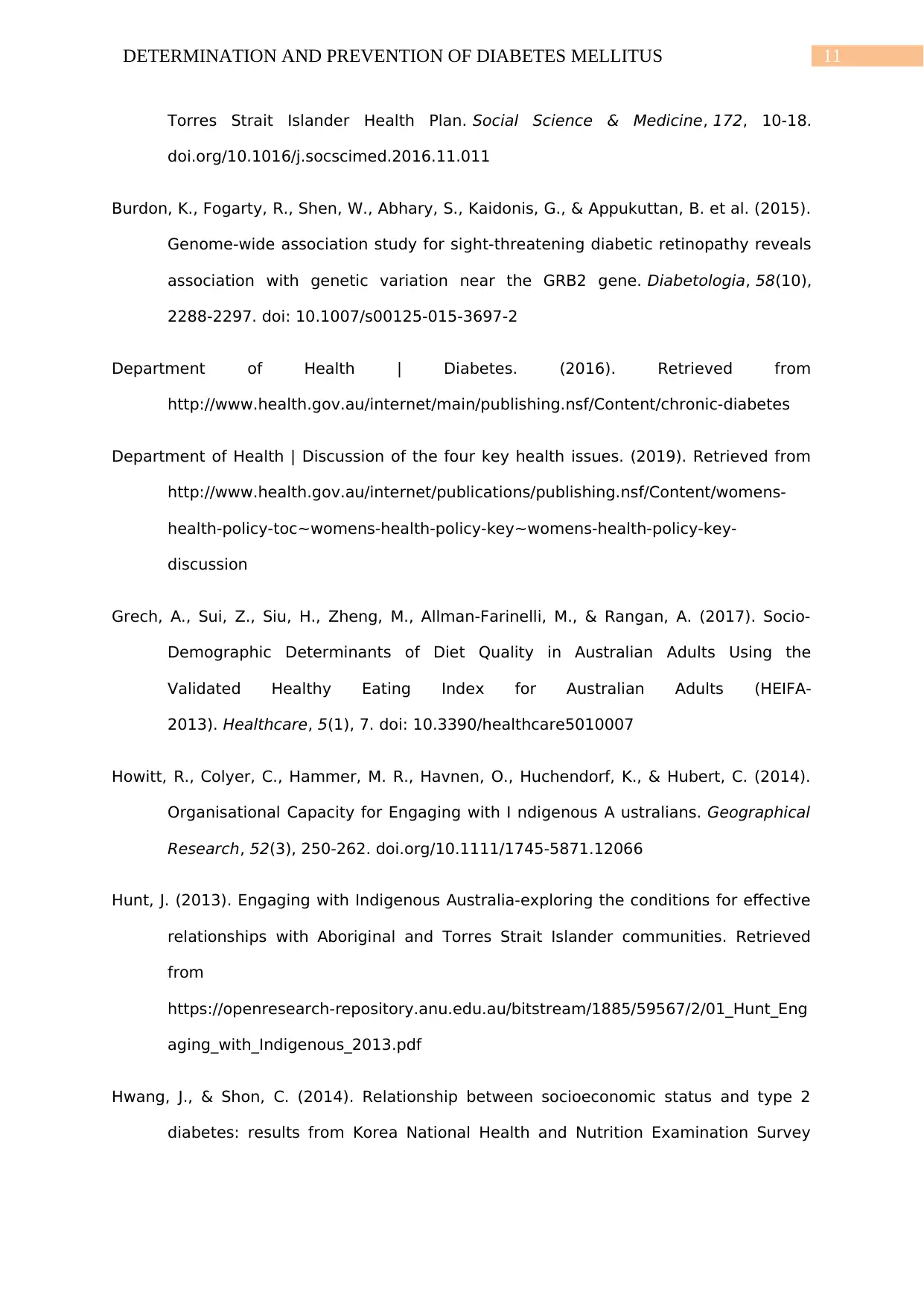
11DETERMINATION AND PREVENTION OF DIABETES MELLITUS
Torres Strait Islander Health Plan. Social Science & Medicine, 172, 10-18.
doi.org/10.1016/j.socscimed.2016.11.011
Burdon, K., Fogarty, R., Shen, W., Abhary, S., Kaidonis, G., & Appukuttan, B. et al. (2015).
Genome-wide association study for sight-threatening diabetic retinopathy reveals
association with genetic variation near the GRB2 gene. Diabetologia, 58(10),
2288-2297. doi: 10.1007/s00125-015-3697-2
Department of Health | Diabetes. (2016). Retrieved from
http://www.health.gov.au/internet/main/publishing.nsf/Content/chronic-diabetes
Department of Health | Discussion of the four key health issues. (2019). Retrieved from
http://www.health.gov.au/internet/publications/publishing.nsf/Content/womens-
health-policy-toc~womens-health-policy-key~womens-health-policy-key-
discussion
Grech, A., Sui, Z., Siu, H., Zheng, M., Allman-Farinelli, M., & Rangan, A. (2017). Socio-
Demographic Determinants of Diet Quality in Australian Adults Using the
Validated Healthy Eating Index for Australian Adults (HEIFA-
2013). Healthcare, 5(1), 7. doi: 10.3390/healthcare5010007
Howitt, R., Colyer, C., Hammer, M. R., Havnen, O., Huchendorf, K., & Hubert, C. (2014).
Organisational Capacity for Engaging with I ndigenous A ustralians. Geographical
Research, 52(3), 250-262. doi.org/10.1111/1745-5871.12066
Hunt, J. (2013). Engaging with Indigenous Australia-exploring the conditions for effective
relationships with Aboriginal and Torres Strait Islander communities. Retrieved
from
https://openresearch-repository.anu.edu.au/bitstream/1885/59567/2/01_Hunt_Eng
aging_with_Indigenous_2013.pdf
Hwang, J., & Shon, C. (2014). Relationship between socioeconomic status and type 2
diabetes: results from Korea National Health and Nutrition Examination Survey
Torres Strait Islander Health Plan. Social Science & Medicine, 172, 10-18.
doi.org/10.1016/j.socscimed.2016.11.011
Burdon, K., Fogarty, R., Shen, W., Abhary, S., Kaidonis, G., & Appukuttan, B. et al. (2015).
Genome-wide association study for sight-threatening diabetic retinopathy reveals
association with genetic variation near the GRB2 gene. Diabetologia, 58(10),
2288-2297. doi: 10.1007/s00125-015-3697-2
Department of Health | Diabetes. (2016). Retrieved from
http://www.health.gov.au/internet/main/publishing.nsf/Content/chronic-diabetes
Department of Health | Discussion of the four key health issues. (2019). Retrieved from
http://www.health.gov.au/internet/publications/publishing.nsf/Content/womens-
health-policy-toc~womens-health-policy-key~womens-health-policy-key-
discussion
Grech, A., Sui, Z., Siu, H., Zheng, M., Allman-Farinelli, M., & Rangan, A. (2017). Socio-
Demographic Determinants of Diet Quality in Australian Adults Using the
Validated Healthy Eating Index for Australian Adults (HEIFA-
2013). Healthcare, 5(1), 7. doi: 10.3390/healthcare5010007
Howitt, R., Colyer, C., Hammer, M. R., Havnen, O., Huchendorf, K., & Hubert, C. (2014).
Organisational Capacity for Engaging with I ndigenous A ustralians. Geographical
Research, 52(3), 250-262. doi.org/10.1111/1745-5871.12066
Hunt, J. (2013). Engaging with Indigenous Australia-exploring the conditions for effective
relationships with Aboriginal and Torres Strait Islander communities. Retrieved
from
https://openresearch-repository.anu.edu.au/bitstream/1885/59567/2/01_Hunt_Eng
aging_with_Indigenous_2013.pdf
Hwang, J., & Shon, C. (2014). Relationship between socioeconomic status and type 2
diabetes: results from Korea National Health and Nutrition Examination Survey
⊘ This is a preview!⊘
Do you want full access?
Subscribe today to unlock all pages.

Trusted by 1+ million students worldwide
1 out of 14
Related Documents
Your All-in-One AI-Powered Toolkit for Academic Success.
+13062052269
info@desklib.com
Available 24*7 on WhatsApp / Email
![[object Object]](/_next/static/media/star-bottom.7253800d.svg)
Unlock your academic potential
Copyright © 2020–2026 A2Z Services. All Rights Reserved. Developed and managed by ZUCOL.





